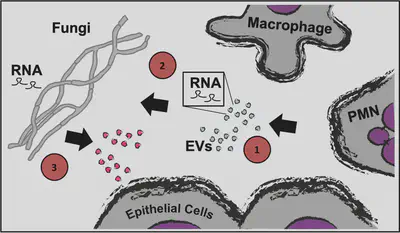Research and Ethos
Fungi are a major source of human morbidity and mortality, causing over 1 billion infections annually. In fact, fungal infections are estimated to kill over 3.75 million people per year, a staggering tally. Yet, despite their obvious importance, diagnosis and treatment both remain challenging. New therapeutic and diagnostic options are urgently needed to combat the increased occurrence of antifungal resistance and the lengthy time to diagnosis. Learn more at Gaffi.
The Independent Junior Research Group RNA Biology of Fungal Infections (RBI) at the Leibniz-HKI and generously sponsered by the German Federal Ministry of Education and Research (BMBF) and Leibniz Association aims to close the gap between basic and translational research through an interdisciplinary research program focused on understanding fungal pathogenesis through the lens of RNA biology. It has previously been shown that RNA molecules can influence the outcome of infections caused by fungi. We are particularly interested in the detection of RNA populations in host extracellular vesicles that are produced in response to an infection and that might serve as possible diagnostic markers. In addition, we are working to advance our understanding of fungal non-coding RNAs and RNA modifications to facilitate the advancement of new targets for RNA-based therapeutics. Current projects in the group address:
- the RNAs produced by the host in response to infection
- the influence of extracellular RNA on invading fungi
- RNA regulatory mechanisms in fungal pathogens

The recent development of RNA-based therapeutic agents for the treatment of genetic disorders, viral infections, and plant fungal infections all provide convincing examples of the potential of RNA-based therapeutic agents against human fungal infections. New approaches for the diagnosis and treatment of fungal infections will ultimately improve our understanding of fungal pathogenesis, open up new pathways of treatment and diagnosis, and benefit society directly.
More importantly, we are dedicated to providing a rigorous, inclusive, diverse training enviroment for the next generation of budding scientists. In order to facilitate training, we also hope to collaborate widely in the research community. Get in touch if you are interested in setting up a shared lab meeting or pitching a collaborative project!
Funding Sources
